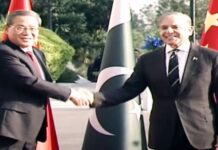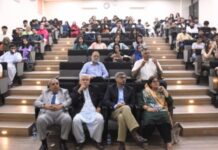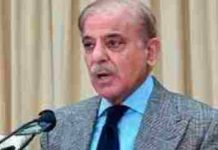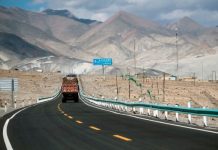ISLAMABAD, Mar 04 (NNI): Pakistan’s climate defender Ayisha Siddiqa has been included in Time Magazine’s 2023 Women of the Year, calling them extraordinary leaders who are working toward a more equal world.
The mass circulation US weekly magazine will host its second annual Women of the Year Gala on International Women’s Day, on Wednesday next, in Los Angeles.
The list includes extraordinary leaders who have been working toward a more equal world and creating a better future for women by building bridges “across generations, communities, and borders,” according to the magazine’s website.
Siddiqa, 24, has been making the world think differently about climate action by channeling her feelings into poetry as a form of protest. “When Ayisha Siddiqa talks about poetry, her face lights up,” the magazine wrote on its website.
“For the 24-year-old Pakistani human rights and climate defender, poetry represents hope — a way to bring humanity back into the staid, high-level conversations that increasingly occupy her time.”
At the annual UN climate conference in Egypt in November, Siddiqa shared an original poem, titled “So much about your sustainability, my people are dying,” as a rebuke to world leaders for their failure to act on climate change. “Siddiqa felt the effects of this lack of action viscerally last year as she witnessed from afar the life-altering impacts of Pakistan’s floods, likely made more extreme by global warming,” TIME said.
At 14, Siddiqa realized how unsafe the environment could be after witnessing the illness and death, including of her grandparents’, that came from her community’s polluted river water in eastern Pakistan, according to the magazine.
The activist became aware of the link between human rights and climate change, realizing that for some people, access to resources was worth killing for. “These realities and values are what motivate Siddiqa to use her voice to uplift the vulnerable and hold polluters to account,” TIME wrote.
Somali boxer and model Ramla Ali, American singer Phoebe Bridgers, Ukrainian rights activist Olena Shevchenko, US soccer player Megan Rapinoe among others also made it to the list for their inspiring journeys.
The Pakistani climate activist said told the Time: “I was raised with the idea that the earth is a living being, that she gives life to you and in return, you have a responsibility. And I think we, collectively, have come to a point where we are ignoring the cries of earth mother.”
Siddiqa said, “We have reached a point where we are collectively ignoring the cries of mother earth. This is how the climate crisis is linked to women and girls because of the same structures that are abusing, hurting, and taking without consent.
“This is how we treat planet earth. This is how we treat the very thing which gives us life”, she added.
Siddiqa highlighted last year’s flooding in Pakistan, saying, “In South Asia, climate change disproportionately affects women. When people are displaced, women have to go get water, raise the children, women have to find work. There were 60,000 women that were pregnant during August and we didn’t have enough haemoglobin, collectively, to save them.”
“When they were giving birth, lots of mothers lost their lives,” said. “We are reaching the climate crisis with a very global north lens.” “We need to think more dynamically about the solutions,” she said. “The majority of the world that is facing the effects of climate change is actually citizens of unstable governments.’
“This is what we have to critically apply as part of the equation when we think of climate solutions when we think of legal solutions, economic and technical solutions,” Siddiqa noted.
“We need to do it fast,” she added.
The Pakistani climate activist said when the naturally resourced countries would not able to provide raw materials to the industrialised countries the global north will collapse.
“One thing that climate crisis teaches us is we are in this together. We need to think of this crisis as a collective global crisis. We cannot be individualistic anymore. It will not work, she remarked. NNI








































